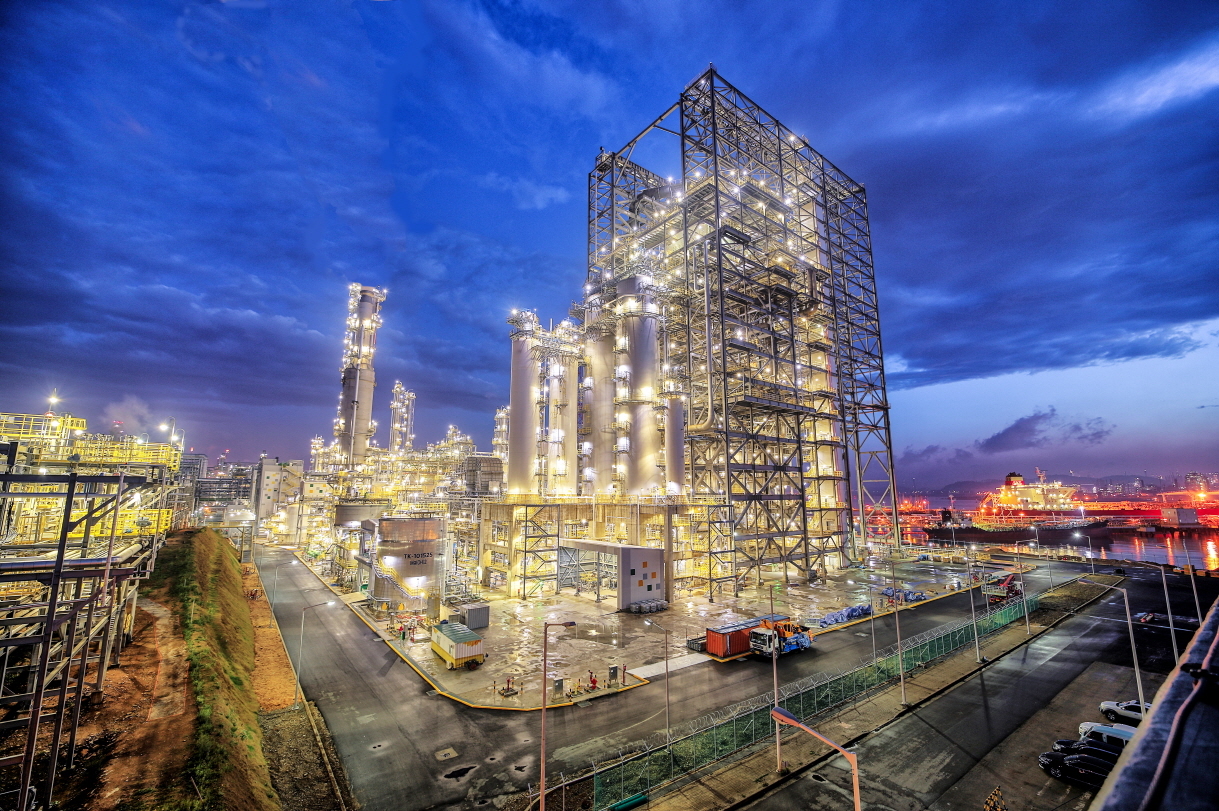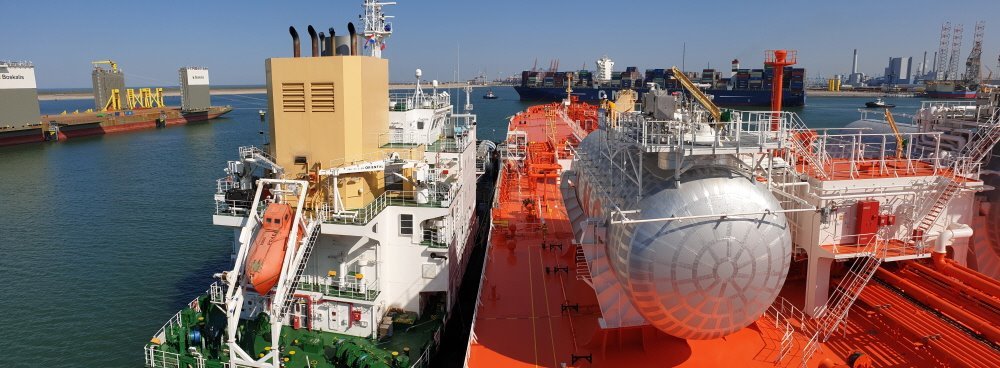The Korea Herald is publishing a series of articles on the quest of South Korea’s government and businesses to switch to renewable energy. -- Ed.
New environmental regulations in international waters could serve as a momentum for Korean oil refiners and shipbuilders to seek new opportunities in the sluggish markets.
In response to heightening environmental concerns and growing harmful emissions from ships, the International Maritime Organization has ruled that from January 2020 ships will have to use fuel with a maximum of 0.5 percent sulfur content, down from the current 3.5 percent.
To abide by this, ship owners have three options.
First, they can simply switch high-sulfur fuels to low-sulfur fuels or marine gas oil at higher costs. Second, owners can install exhaust gas cleaning systems, or scrubbers, on their ships. Third, ships can run on liquefied natural gas.
Although the rule is not binding, many large ship owners in the 174 member nations have already started taking measures in line with the IMO rules. And, their new action to buy either costly fuel oil or eco-friendly vessels will create new markets for South Korean oil refiners and shipbuilders.
Initially, ship owners are likely to opt for buying low-sulfur fuel oil, according to industry analysts, including Samsung Securities. This is because installing exhaust gas cleaning systems or purchasing new LNG-fueled ships requires more money and time. To install scrubbers, it costs around $3 million to $5 million per vessel and takes around three to eight months.
The world’s largest ship operator Maersk and other big firms, including China Ocean Shipping Co. and French company CMA CGM, decided to respond to the new rules with low-sulfur fuel oil in the meantime. In Korea, more than 70 percent of the ship owners are also likely to turn to the costly fuel oil for the time being, according to the Korea Shipowners’ Association.
Opportunity for oil refiners
Ship owners’ option to choose low-sulfur fuel oil or marine gas oil is expected to be an opportunity for local oil refiners -- SK Innovation, S-Oil, Hyundai Oilbank and GS Caltex. The eco-friendly oil is more lucrative than high-sulfur fuel oil, which is currently used by vessels.
In response to the stronger environmental regulations, the four firms have already started investing in desulfurization, a chemical process for the removal of sulfur from a material.
 |
S-Oil’s residue upgrading complex in Onsan, Ulsan (S-Oil) |
SK Energy, an affiliate of SK Innovation, is injecting around 1 trillion won ($823 million) in the construction of vacuum residue desulfurization. When completed next year, it will be capable of producing 40,000 barrels of low-sulfur fuel oil per day. Combined with the capacity of another arm SK trading international, SK Innovation will be able to produce a combined 130,000 barrels of low-sulfur fuel oil per day next year.
Three other firms are also equipped with similar facilities in response to the IMO rules although they do not precisely target fuel for vessels.
S-Oil spent 5 trillion won on building a residue upgrading complex and olefin downstream complex, or RUC and ODC, which started commercial operations in November last year. The portion of high-sulfur fuel oil is expected to be cut by half.
Hyundai Oilbank has injected 800 billion won since last year to upgrade its facilities to produce more low-sulfur gas oil. GS Caltex also has facilities that can convert 274,000 barrels of high-sulfur fuel oil to light oil per day.
The four companies, which posted poor earnings due partly to weak refining margins in the second quarter, are expected to benefit from the IMO 2020 regulations in the latter half.
In the second quarter, S-Oil posted an operating loss of 90 billion won. SK Innovation and Hyundai Oilbank also saw operating profit fall by 41 and 50 percent, respectively, while GS Caltex saw its operating profit plummet 77 percent year on year.
SK Innovation said it expected to see improved refining margins as demand for low-sulfur fuel oil for testing is on the rise as the IMO 2020 deadline draws near. Three other firms made a similar prediction in their earnings statements.
Han Sang-won, a researcher at Daishin Securities, said if ship owners respond to the IMO’s tighter regulations by shifting fuels, it will be conducive to Korean oil refiners. “The combined operating profit of SK Innovation and S-Oil is predicted to grow 161 percent in 2020 compared to a year earlier. Hyundai Oilbank and GS Caltex are also expected to gain a benefit from the IMO regulations.”
According to London-based shipping service firm Clarksons Research, high-sulfur fuel oil accounted for 72 percent of a combined 270 million tons of shipping fuels used last year. More than half of global and Korean ship owners are predicted to convert to low-sulfur fuel oil next year to meet the IMO rules, said the Korea Shipowners’ Association.
New market for shipbuilders
Although oil refiners will be beneficiaries of the rules in the short run, ship owners will eventually purchase eco-friendly vessels in the future to meet ever-tightening environmental regulations, industry watchers said.
 |
Samsung Heavy Industries’ LNG-fueled oil tanker (Samsung Heavy Industries) |
This paints a rosier outlook for Korean shipbuilders, which saw their orders markedly fall in the first half of this year amid growing uncertainties in the global market, including the US-China trade war and the deteriorating relationship between the US and Iran. The worldwide shipbuilding orders from January to June fell by 42 percent to 10.2 million compensated gross tonnage, according to Clarksons Research.
In the future, however, the IMO regulations are expected to create new markets.
The world’s second- and third-largest ship owners, Mitsui OSK and CMA CGM, are set to adopt LNG-fueled ships in the long term, although Mitsui OSK will install scrubbers and CMA CGM will use low-sulfur fuel oil in the short run.
“Because the technologies of LNG-fueled vessels and LNG carriers are similar, growing demand for LNG-fueled ships will benefit Korean shipbuilders, top players in LNG carriers,” said Lee Dong-heon, a researcher at Daishin Securities.
Currently, the global LNG carrier market is dominated by Korean firms. They obtained 21 LNG carrier orders out of 27 orders placed worldwide in the first half of this year, according to Clarksons.
The nation’s three largest shipbuilders have already seen a steady rise in LNG-fueled ship orders in recent years in response to growing environmental regulations.
Korea Shipbuilding & Offshore Engineering, formerly known as Hyundai Heavy Industries, has won 30 orders of LNG-fueled vessels since 2016. It obtained 23 orders in 2018 and 2019 after having seven orders in 2016 and 2017.
“Eco-friendly regulations create a new market and new technologies, which are more lucrative and high-value, in the shipbuilding market. The trend of eco-friendly and smart vessels will appear to continue for a while,” said a KSOE official.
Another large firm Daewoo Shipbuilding & Marine Engineering has won 17 orders of LNG-fueled ships over the last two years after five orders in the previous two years. Samsung Heavy Industries has won 10 orders over the past four years.
Beyond LNG-fueled vessels, new demand for eco-friendly vessels will rise in the distant future.
In 2050, IMO plans to rule that the total annual greenhouse gas emissions from ships should be reduced by at least 50 percent compared to 2008. This will require ship owners to purchase hydrogen-powered or electric vessels, which emit less air pollution than LNG-fueled ships.
Uncertainty existsWhat the IMO regulations will bring to the industries, however, may not be very promising.
“Uncertainty still exists,” said Yang Jong-seo, a researcher at Export-Import Bank of Korea’s global research center specializing in the shipbuilding and marine sector.
In the long term, ship owners will have to determine whether they should buy LNG-fueled, hydrogen or electric vessels -- to meet ever-tightening environmental regulations.
This means shipbuilders here face the task of preparing for every type of vessel without enough research and development budget compared to Chinese rivals fully backed by the government, according to Yang.
“The IMO regulations can be an opportunity but, at the same time, the risk current players face as leaders and followers can be reversed in a flash,” the researcher said.
As for oil refiners too, some analysts, including Lee Eung-joo, a researcher at Shinhan Investment, are not overly optimistic about the IMO-regulation led benefits because ship owners will initially respond to the rule with costly fuel but will find other alternatives, including scrubbers and LNG-fueled vessels in the long run.
By Shin Ji-hye (
shinjh@heraldcorp.com)









